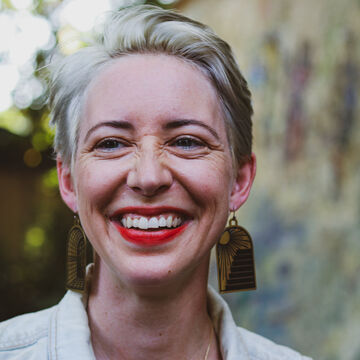

Kate Lechler
Lecturer
Contact
Bio
I’m Dr. Kate (they/them)–an educator, writer, and editor. I moved to Chicago in 2023 and currently teach first-year writing at the School of the Art Institute of Chicago, teaching classes themed around Food, the Sea, and short stories. My Ph.D. from Florida State University is in early British literature, with a special emphasis on drama and the history of the book. My other research interests include the staging of women’s bodies; fairy tales and folklore; and science-fiction, fantasy, magical realism, and horror. For 10 years before coming to SAIC, I taught English Literature at the University of Mississippi.
My creative writing interests are mostly in fantasy, magical realism, science fiction, and horror. My poetry and fiction has appeared in Podcastle, Fireside Fiction, Arsenika, and Illumen, among other places. My non-fiction essays have appeared at Superstition Review and The Deadlands. I also reviewed sci-fi & fantasy at FantasyLiterature.com where I once curated a column, “The Expanded Universe.”
Publications
"This Great Rumble," Fusion Fragment, short story, Feb 2025; "Extreme Sports Club for Octogenarians," The Deadlands, short story, Jan 2025; “How to Haunt Your Local Forest,” Fireside Fiction, short story, June 2021; “The Thing that Doesn’t Disintegrate,” The Deadlands, essay, June 2021; “His Hands on My Skin,” Typehouse Literary Magazine, short story, January 2021; “The Witch in the Woods Falls in Love a Third Time,” Shimmer, flash fiction, November 2018; “The Magician Deletes Her Feed,” Kaleidotrope, short story, July 2018; “Cthulhu Listens to the Beach Boys,” Liminality, poem, Sept 2017; “The Breathtaking Sting of the Pull,” Superstition Review, essay, May 2017; “The Hulder’s Husband Says Don’t,” Fireside Fiction, flash fiction, April 2017; “The Lost Heirs of Rose McAlder,” Metaphorosis, short story, March 2017; “The Beautiful Bird Sits No Longer Singing in the Nest,” Podcastle, short story, September 2016.
Personal Statement
The kind of reading, writing, and thinking that excites me most is the kind that helps us to, in the words of E.M. Forster, “only connect.” My goal in the classroom is to teach my student to make such connections for themselves. In other words, I not only teach them about audience, rhetorical strategies, sound, and structure, but I also strive to help my students experience a congruence between the academic and cultural traditions to which they belong and their lives outside school. As such, bringing experience into the classroom—or the classroom to an experience—is important to me.